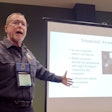“Over the last few years there’s been a lot more use of citizens in police work,” explains Jacqueline Helfgott, associate professor of criminal justice at Seattle University in Washington state. “Police cannot do it all, so now the Internet can help citizens get involved with their community’s police force.”
Police in the small town of Fairmont, Minn., posted a most wanted list on the department’s Website and publicized the site in the newspaper. Four of the ten people posted were apprehended in the first week with the help of citizens’ tips.
In Medina, Wash., a bedroom community east of Seattle, Chief Michael Knapp created a Community E-Lert program, which sends e-mails to 1,200 subscribers in the area.
“It changes policing because we involve the community in a partnership – in addressing the criminal problems of our city,” Knapp says. “When you do that you’re going to become more efficient.”
E-Lerts have also encouraged citizens, Knapp says, to give police feedback on what they think of police work in their community.
Bill Berger, North Miami Beach, Fla., and a past president of the International Association of Chiefs of Police, believes the nature of the Internet encourages more citizen involvement.
“A lot of times people don’t want to get involved,” he says. “But something about the anonymity of the Internet makes citizen participation easier. They can e-mail information, say to us, ‘Here – check this out.’ It’s almost like it creates a veil, an extra level of distance and safety.”














